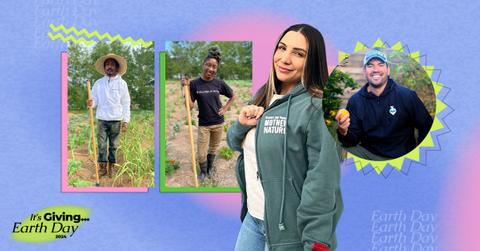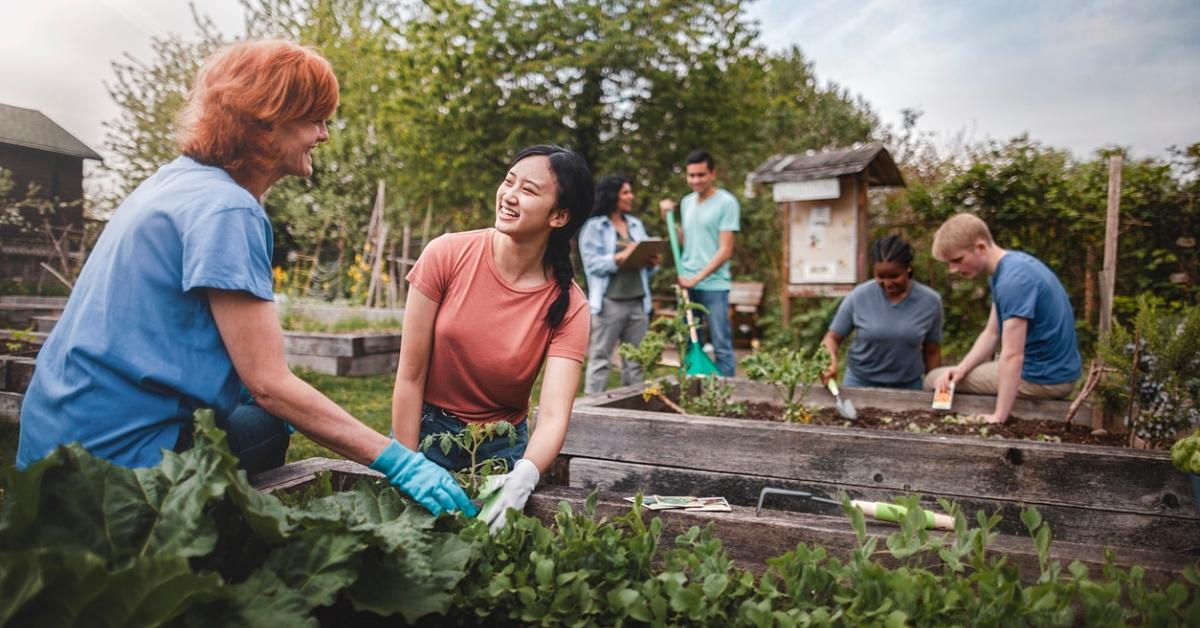It's Giving... Growth: Sustainable Gardening Influencers on Their Eye-Opening Growing Journeys (Exclusive)
"Growing is a journey, and you learn not only about how to take care of plants, but also yourself," Angelique Taylor and Kip Ritchey tell Green Matters.
Published April 25 2024, 1:00 p.m. ET

To truly connect with the planet that provides us with everything we need to survive, perhaps we must use natural resources in a way that honors Mother Earth. Amazingly, we can simultaneously nourish our minds, bodies, and the land without Uber Eats.
In honor of Earth Day 2024, we exclusively spoke via email with planet-loving, veggie-growing, and inspiring gardening influencers Kevin Espiritu of Epic Gardening, Sabrina Pare of EcoTok Collective, and Angelique Taylor and David "Kip" Ritchey of Smarter By Nature.
While gardening is typically associated with everything green, the use of chemical weedkillers, pesticides, and synthetic fertilizers has vile consequences. According to The Union of Concerned Scientists, overuse of chemical fertilizers and industrial farming practices has damaged soil, fuels algal blooms, and contributes to environmental justice issues. The fertilizer industry is responsible for approximately 5 percent of global heat-trapping emissions.

Plus, the U.S. EPA relays that pesticide exposure may negatively impact human nervous and/or endocrine systems.
At Green Matters, we aim to highlight responsible, sustainable growers who've "grown" alongside their luscious bounties of fruits, veggies, and herbs.
These interviews have been lightly edited and condensed for length and clarity.
Kevin Espiritu, founder and CEO of Epic Gardening
GREEN MATTERS: What have you learned about sustainability, eco-conscious living, and yourself since starting your gardening journey in 2010?
KEVIN ESPIRITU: Gardening unlocked an understanding of what goes into being a more sustainable and eco-conscious person. As you garden, you start asking questions like, “Where does food actually come from?” and “What materials are used to produce our food?” Gradually, you unpeel the layers of the onion (pun intended!) of our country's entire food and logistics system. It makes you realize what goes into food production, and that awareness helps you consume less or produce more.
GM: What’s your favorite eco-friendly/low-waste edible plant to grow?
KE: You could grow a crop of potatoes with a few organic store-bought potatoes! When you harvest, compost the dead foliage, replant a few tubers in almost any soil, and you’ll have a bumper crop of potatoes year after year, often with very little water.
GM: How can gardening enthusiasts respect the planet this Earth Day and beyond?
KE: Instead of falling into the cycle of buying, throwing away, and buying anew, choose products built to last. Find methods of DIYing in your garden, whether by building a compost bin out of old pallet wood or learning to save seeds. Let the gardening journey help you become more of a producer than a consumer.
Sabrina Pare, co-founder and executive director of EcoTok Collective
GREEN MATTERS: How has your “imperfect sustainability journey” incorporated growing your own food?
SABRINA PARE: I wanted organic, plastic-free produce available in my backyard! It is estimated that, on average, produce travels approximately 1,500 miles to get from farm to grocery store, a journey that uses large quantities of fossil fuels and contributes to emissions.
The use of additives like fertilizers, herbicides, and pesticides in farming can pollute soil and waterways. Pesticides and herbicides are also toxic to beneficial insects like honeybees.
GM: What’s your favorite eco-friendly/low-waste edible plant to grow?
SP: Growing spinach is as low-waste as it gets! Simply get a seed packet (packaging is usually recyclable) and sprinkle it into your garden. Spinach ranks second on the Dirty Dozen list of fruits and vegetables with the most pesticides.
GM: How can gardening enthusiasts respect the planet this Earth Day and beyond?
SP:
- Planting native plants can help preserve biodiversity and reduce the risk of invasive species disrupting local ecosystems.
- Collecting rainwater (via rain barrels) reduces reliance on municipal water supplies. Additionally, practicing water-efficient irrigation techniques such as drip irrigation and mulching can minimize water waste.
- Composting reduces waste, enriches the soil, improves soil structure, and enhances plant health. I currently vermicompost (worm composting) and love it!
Angelique Taylor and David "Kip" Ritchey, co-founders of Smarter By Nature
GM: How did your “edible food forest” and growing journey impact how you view/practice sustainability and eco-friendly living?
ANGELIQUE TAYLOR & KIP RITCHEY: In September 2014 the two of us had just become part of the NY Peoples Climate March. As graduates of Florida A&M University and Florida State University, we decided to take our experiences and travel, soon noticing that damaged land, communities, and people exist across the world. The same concern for clean water, energy, air, and land is found from Tallahassee to New Zealand, from California to India. This damage is a result of current societal systems which devalue nature and promote an insatiable pattern of consumption in the minds of its people without regard for longevity of resources. The result is scarcity, disproportionate distribution of resources, and a loss of integrity.
Our passion for regenerative growing methods led us to virtually research and explore farms across the world, implementing our knowledge in at our community gardens. We started our business in 2017 as regenerative growers, growing food on lots in the urban areas of Tallahassee.
GM: What’s your favorite eco-friendly/low-waste edible plant to grow?
AT&KR: Longevity spinach — a low maintenance, easy-to-propagate, resilient perennial spinach — is capable of growing in shade, semi-shade, and full sun if the roots don’t die. After removing the leaves, you can plant the stalk in soil to produce a new plant! It's an incredible plant that can also be used as chop-and-drop mulch or natural fertilizer.
GM: How can gardening enthusiasts respect the planet this Earth Day and beyond?
AT&KR: Grow a diversity of plants. Support local small scale farmers. Try growing an herb or vegetable to begin to understand and value what it takes to grow healthy food. Positively engage children in growing a garden so they can develop respect for the Earth.
This article is part of Green Matters’ 2024 Earth Day programming, It's Giving... Earth Day: A series about the people and organizations who are “giving” Earth Day 24/7. We hope these stories inspire you to embody the spirit of Earth Day all year round.